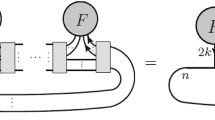Abstract
We obtain a combinatorial formula related to the shear transformation for semi-invariants of binary forms, which implies the classical characterization of semi-invariants in terms of a differential operator. Then, we present a combinatorial proof of an identity of Hilbert, which leads to a relation of Cayley on semi-invariants. This identity plays a crucial role in the original proof of Sylvester’s theorem on semi-invariants in connection with the Gaussian coefficients. Moreover, we show that the additivity lemma of Pak and Panova which yields the strict unimodality of the Gaussian coefficients for \(n,k \ge 8\) can be deduced from the ring property of semi-invariants.

Similar content being viewed by others
References
Andrews, G.E.: The Theory of Partitions. Cambridge University Press, Cambridge (1998)
Cayley, A.: A second memoir upon quantics. Philos. Trans. R. Soc. Lond. 146, 101–126 (1856)
Chen, W.Y.C., Jia, I.D.D.: Semi-invariants of binary forms pertaining to a unimodality theorem of Reiner and Stanton, Int. J. Math., to appear
Christandl, M., Harrow, A.W., Mitchison, G.: Nonzero Kronecker coefficients and what they tell us about spectra. Commun. Math. Phys. 270, 575–585 (2007)
Grosshans, F.D.: The work of Gian-Carlo Rota on invariant theory. Algebra Universalis 49, 213–258 (2003)
Hilbert, D.: Theory of Algebraic Invariants, Cambridge University Press, Cambridge, (Translated from the German and with a preface by Reinhard C. Laubenbacher. Edited and with an introduction by Bernd Sturmfels) (1993)
O’Hara, K.M.: Unimodality of Gaussian coefficients: a constructive proof. J. Combin. Theory Ser. A 53, 29–52 (1990)
Pak, I., Panova, G.: Strict unimodality of \(q\)-binomial coefficients. C. R. Math. Acad. Sci. Paris 351, 415–418 (2013)
Pak, I., Panova, G.: Strict unimodality of \(q\)-binomial coefficients (new version), arXiv:1306.5085
Pak, I., Panova, G.: Unimodality via Kronecker products. J. Algebraic Combin. 40, 1103–1120 (2014)
Proctor, R.A.: Solution of two difficult combinatorial problems with linear algebra. Am. Math. Monthly 89, 721–734 (1982)
Stanley, R.P.: Weyl groups, the hard Lefschetz theorem, and the Sperner property. SIAM J. Algebraic Discrete Methods 1, 168–184 (1980)
Stanley, R.P.: Enumerative Combinatorics, vol. 1, 2nd edn. Cambridge University Press, Cambridge (2012)
Sylvester, J.J.: Proof of the hitherto undemonstrated Fundamental Theorem of Invariants, Philos. Mag. 5, 178–188 (1878). Reprinted in: The Collected Mathematical Papers of James Joseph Sylvester, vol. 3, Cambridge University Press, Cambridge, (1909), pp. 117–126
White, D.E.: Monotonicity and unimodality of the pattern inventory. Adv. Math. 38, 101–108 (1980)
Zeilberger, D.: Kathy O’Hara’s constructive proof of the unimodality of the Gaussian polynomials. Am. Math. Monthly 96, 590–602 (1989)
Acknowledgements
We wish to thank the referee for invaluable comments. This work was done under the auspices of the National Science Foundation of China.
Author information
Authors and Affiliations
Corresponding author
Additional information
Dedicated to Doron Zeilberger on the Occasion of His Seventieth Birthday.
Publisher's Note
Springer Nature remains neutral with regard to jurisdictional claims in published maps and institutional affiliations.
Rights and permissions
About this article
Cite this article
Chen, W.Y.C., Jia, I.D.D. Semi-invariants of binary forms and Sylvester’s theorem. Ramanujan J 59, 297–311 (2022). https://doi.org/10.1007/s11139-021-00505-9
Received:
Accepted:
Published:
Issue Date:
DOI: https://doi.org/10.1007/s11139-021-00505-9
Keywords
- Hilbert’s identity
- Sylvester’s theorem
- Binary forms
- Semi-diagrams
- Semi-invariants
- Gaussian coefficients
- Strict unimodality



